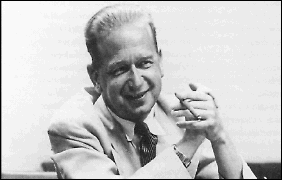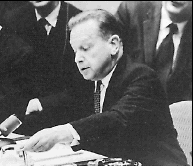
|

|
|
|
|
| | VOLUME 29, NUMBER 23 | WEDNESDAY, MARCH 10, 1999 | ISSN 1199-5246 | | |
|
|
|||||||||
|
|
by David Finestone After a recent screening of "That '70s Show" I ran a search to see if any of my post primary institutions had found their way onto the Web. Indeed, Lindsay Place High School of Point Claire PQ was online! This nostalgia trip evoked memories of the time an enlightened, mild-mannered guidance counsellor noticed that my grades weren't reflective of my exuberant in-class participation, and enlisted my help in trying to discover why - a difficult journey for us both. Coincidently, halfway through my undergraduate studies at York, an exuberant prof. suggested that I "suss out" why my enthusiasm waned when I had to write about the same material that I'd reveled in during tutorials. This led to my discovery of a minor learning disability and to my introduction to the York Counselling and Development Centre (CDC), who now have a fabulous Web site located at www.yorku.ca/admin/cdc A big part of existing with a learning disability is that you don't recognize that there is a problem, simply because you've never known any other way. Fortunately, among other counselling and development initiatives, the CDC offers the Groups Program, a variety of workshops designed to meet the current needs of the York University community. Let's say you encounter a situation similar to mine, where the link between your physical "text to thought" software and your "CPU" is running via a 14.4 modem and slowing down all of the other functions. The CDC site lists a myriad of "links, drivers and utilities" that can put you in touch with positive options and channels, and lead you toward a systems optimum functionality. The CDC invites students, staff and faculty to participate in their programs. Check them out. |
||||||||
|
|
Canada's King: An Essay in Political Psychology by professor emeritus, political and social science, Paul Roazen (Mosaic Press, 1998). Roazen, one of North America's leading psychoanalytic theorists and intellectual historians, is the author of 11 books which have been translated into more than half a dozen languages. Canada's King is a fascinating psychological biography of one of Canada's most prominent political leaders, William Lyon Mackenzie King. Money Logic: Financial Strategies for the Smart Investor by Moshe A. Milevsky, professor of finance, Schulich School of Business (General Publishing, 1999). Money Logic aids readers in making informed decisions by using the scientific method of probability to examine the odds involved in personal financial decisions. Using a intuitive approach, Milevsky has developed a financial risk method based soundly on mathematics and computer simulation models that can be easily applied to any number of investment decisions. In facing each financial scenario, Milevsky takes into account two things: risk regret and time horizon as framed by the "probability of regret theory." Milevsky's book argues that while your financial future - and its success - depend on a variety of factors, most of which are out of your control, you can become knowledgeable about the probabilities of regret associated with financial choices and make choices to minimize regret. Vision and Action edited by psychology professor Laurence R. Harris and computer science professor Michael Jenkin (Cambridge University Press, 1998). The visual processes involved in moving, reaching, grasping, and playing sports are complex interactions. For example, the action of moving the head provides useful cues to help interpret the visual information. Simultaneously, vision can provide important information about the actions and their control. This becomes a reiterative process. This process, and the interactions between vision and action, are the foci of this volume. The book contains contributions from scientists who are leaders in each of the several facets of the subject. The editors consider simple types of action, such as moving the eyes and head and body, as one would do while looking around or walking, as well as complex actions such as driving a car, catching a ball, or playing ping-pong.
|
||||||||
|
|
The Dag Hammarskjöld exhibition will be displayed at the Scott Library until the end of March. An exhibition of the life and times of Dag Hammarskjöld is on display in the Scott Library at York University. Created as part of the 50th anniversary of the founding of the United Nations as well as the 90th anniversary of the birth of Dag Hammarskjöld, the exhibition has been travelling around the world for four years, to excellent reviews (from York it goes to Bangkok.)
Hammarskjöld stepped unexpectedly onto the world stage when he became Secretary-General of the United Nations in 1953. To the general public, the media and the decision makes, he was an unknown Swede. At the time of his equally sudden tragic death eight years later, he had become a legend.
During his eight years as UN secretary-general, Hammarskjöld made himself known as an extremely effective, very dedicated and self-sacrificing civil servant. Peter Wallensteen, author of a booklet about Hammarskjöld produced by the Swedish Institute, believes that he was driven by a personal desire to act quickly, which fitted his perception that problems should be solved before they became complicated. The publication, which is available at the display, deals with some of the crises faced by the UN from 1953-1961, and includes Hammarskjöld's diplomatic efforts in Guatemala, the People's Republic of China, Suez, Hungary and the Congo. |
||||||||
|
|
Every other week, The Gazette will be interviewing people on "The Common" to get answers to specific questions about life at York, and opinions about issues important to students, faculty and staff. By Sandra Guiry
Question: How will the new Federal Budget affect Canadian Universities,York in particular?
|
||||||||
|
|
By Micael Todd POETRY DOESN'T PAY. The Times Literary Supplement (Feb.5 issue) and the Jan./Feb. issue of Index on Censorship examine the debate over the decision by the Oxford University Press to stop publishing modern poetry. The books in the series couldn't turn a profit during tough economic times, writes Keith Thomas, president of Corpus Christi College at Oxford University, and chairman of the Press' finance committee. "Contemporary poetry has a high opportunity cost, involving, as it does, a diversion of managerial time, capital, and marketing resources," he wrote in the TLS. "Writing poetry is a valuable activity, but it is not an academic one." In Index on Censorship, Frank Kermode rejects such arguments. Kermode, an author who formerly worked at the Cambridge University Press, writes that academic presses must find ways to publish worthy but unprofitable work, including poetry. "To kill off poetry for the sake of a trifling saving can surely be seen by all except the accountants as an unnecessary and self-destructive act," he writes. (See The Times Literary Supplement @ www.the-tls.co.uk and Index On Censorship @ www.indexoncensorship.org) TECHNOLOGY AND SOCIAL INEQUALITY. More research is needed on how information technology may be exacerbating social and economic inequalities in the United States and abroad, said international scholars and policy makers who met recently to draw attention to the social impact of the Internet. (http://chronicle.com/infotech2/17/99) HANGING WITH YALE. Yale University will receive 155 paintings, drawings, and sculptures - including works by Paul Cezanne and Edgar Degas - and $90-million from the estate of Paul Mellon, the philanthropist and art collector, Yale officials learned this month. INDIA'S NEW CANON. Hindu nationalists in the government have embarked on a major campaign to remake the country's education system, with the goal of "recouping lost cultural values." YOUR WRITING MISSION SHOULD YOU DECIDE TO ACCEPT IT. Defining the mission of campus writing centres, while "institutionally specific," suffer in general from a lack of identity, writes Elizabeth H. Boquet, an assistant professor of English at Fairfield University's writing centre. In their evolution from language laboratories, where methods were taught in formal classes, to their current status, they have become misunderstood by their institutions and even their own staff members. She says it is time for people working in writing centres to focus on just what the centres should be. (See http://ncte.org/ccc/) ResearchThe Office of Research Administration (ORA) would like to remind faculty members of these research opportunities with upcoming deadlines. Deadlines listed are those of the granting agencies. Applications for external sources of funding (i.e., outside York) must be submitted to ORA before forwarding them to the agencies. To assist in meeting these deadlines, it is recommended that applications be submitted to ORA one to two weeks prior to the deadline dates. |
||||||||
| | Current Issue | Previous Month | Past Issues | Rate Card | Contact Information | Search | |






